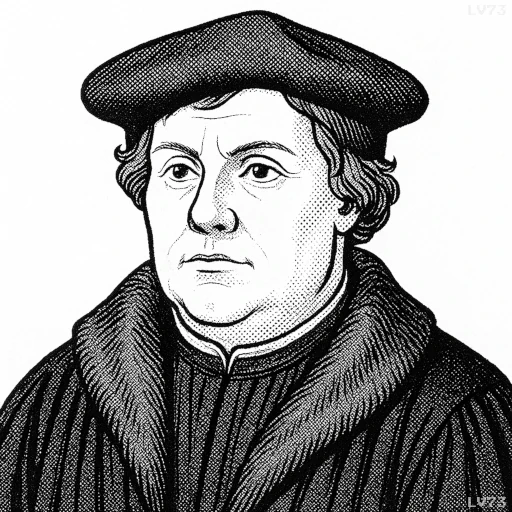“I cannot and will not recant anything, for to go against conscience is neither right nor safe. Here I stand, I can do no other, so help me God. Amen.”

- November 10, 1483 – February 18, 1546
- Born in the Holy Roman Empire (Germany)
- Reformer, theologian
table of contents
Quote
“I cannot and will not recant anything, for to go against conscience is neither right nor safe. Here I stand, I can do no other, so help me God. Amen.”
Explanation
In this iconic declaration, Martin Luther firmly defends the authority of conscience and his unwavering commitment to his beliefs, even in the face of severe opposition. Luther is asserting that to go against his conscience—which he believed was guided by God’s truth—would not only be morally wrong but also spiritually dangerous. By refusing to recant his teachings, particularly his criticisms of the Catholic Church, Luther emphasizes the importance of staying true to one’s inner conviction and moral integrity, regardless of external pressure. His declaration, “Here I stand, I can do no other,” signifies his resolve to remain faithful to the truth he has discovered, even if it leads to personal or institutional consequences.
Luther’s stand at the Diet of Worms in 1521, where he made this statement, marked a pivotal moment in the Protestant Reformation. It was a direct challenge to the Church’s authority, especially in relation to the sale of indulgences and other practices Luther saw as corrupt. This act of defiance was rooted in his theological conviction that salvation and truth were to be found in Scripture and personal faith, not in the authority of the Church or its leaders. Luther’s refusal to recant became a symbol of his commitment to religious freedom and individual conscience, asserting that no earthly power had the right to force someone to act against what they believed to be true.
In modern times, this quote resonates as a powerful reminder of the importance of standing firm in one’s principles and convictions, especially when faced with opposition or pressure to conform. Whether in ethical dilemmas, social justice movements, or personal integrity, Luther’s words highlight the importance of aligning one’s actions with their moral compass, regardless of external challenges. In an age where societal or political forces often seek to influence individual thought and action, this declaration stands as a call for the preservation of freedom of conscience and the courage to uphold what one believes to be right, even in the face of adversity.
Would you like to share your impressions or related stories about this quote in the comments section?

